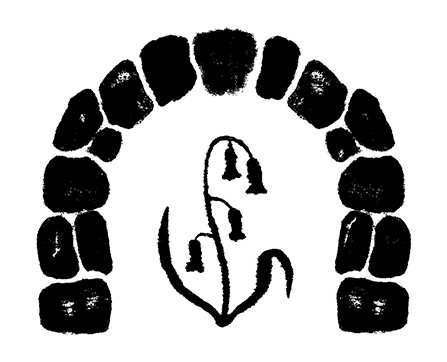Pity's Vomitorium by Fan Wu
Jordan was a pale thin boy with a nervous twitch for a smile. Jordan you should try to get some sun. His constantly upturning lips, which seemed to anticipate joy without expressing it, bespoke a tic of attempted hospitality yet belied his discomfort with sociality. He was a math whiz with delicate features and my best friend and so pure of spirit—his parents never bought him any video game consoles, that’s how untainted he was. We were both weak boys, not up to the snuff of boyhood machismo; though where I self-exempted from masculinity via my strong stubborn proclivities toward Sailor Moon, his emasculations were unchosen, given to him by the fate of a frail body.
We were on the school bus to the roller rink, the very prospect of which was a doomed affair for us. Poor Jordan, sheet-white from motion sickness, made it all the way to the rink’s parking lot before he hurled, missing by centimeters the brown bag I’d held up with hopeful fingers. The smell of bile mixed with schoolbus pleather; the puke was wispy, stringy, so insubstantial I wondered how it could have mustered up enough force to be projectiled. The other kids evacuated the bus, sniggering into the open air. At that age the reality principle was just beginning to set in; the sheer delight of one’s own viscera as plaything was starting to become shadowed with shame.
I stood there beside him blush with embarrassment and love (a love that even then, to take a psychoanalytic sidestep, mirrored my mother’s unrelenting care), a love whose essence was care mistaken for love, and only enhanced by my physical revulsion at the pukescent; I felt whirling through me the need to take the position of the protector (Tracey Thorn sings this feeling precisely on her Massive Attack track: I’ll stand in front of you / I’ll take the force of the blow / Protection… ), to safeguard Jordan from pain, nausea, shame; all the evils the world rained unjustly on him, who ought to have been the benefactor of all the forces of the world that coddle and console. Was it pity in this scene that aroused me, not genitally but spiritually, as a boy? If so, what was it about pity—was it the power differential between the helpless and the healthy? Was it because then and there, in his moment of weakness, room was made for me in Jordan’s life, a clear way in which I was needed, where eros existed as the desperate substitution of necessity for love?
I know this eros as an overwhelming jumble of feelings that include the desire to fuck, the desire to consume what’s out of reach—though I only knew it back then, at age ten, as a warmth in my chest that made me want to suckle on my own cheek meat, a warmth as much constrictive (as though my torso were being pulled taut) as expansive (as though I overflowed with the infinitude that tied my fate to another). He’s the first friend I can remember and the first in a long series of boys with whom friendship always spilled past itself into an excess taboo enough to burst friendship apart from within, as friendship depends on boundaries that distinguish it from other names for love. A certain wanting-more had always been hidden behind friendship; a certain boundlessness that screams we could have so much more than this—we could have touch.
Remembering childhood is always a management of distortion: nostalgia, fantasy, and backwards projections make our self-given ideas of our childhoods ever mutating. I can’t remember what we talked about, or if we ever talked; only the imprint of a sensorium remains of this childhood friendship of melted strawberry ice cream not licked from each other’s pinkies; of Super Nintendo at my house a light waft of footsmell dew over Sonic the Hedgehog music; black holes of sugar and screen as the joy spaces when we took breaks from work; and Jordan beside me, a kind of soul-guide lantern, and between us a magnetic, celebratory spark that went nameless in its love. Childhood is this gauzy constellation of dimly lit feelings; and that which was felt as erotic, the first stirrings of that species of intimacy with the oomph of truth behind it, gently pierces through the dimness.
I still reckon with the aftermath of mistaking pity for love in my erotic landscape, where its most suspect manifestation is the fetishization of pain—the misrecognition of suffering as truth. It’s a reckoning that likely will last a lifetime, because its awakening came over me wholly unchosen, and I’m left clawing at the delightful consequences, the frustrating consequences. In Jordan there was always this immense quietude of will where he silently accepted his “flaws” and bettered them, never boasting, just toiling in private to make good on his potential. When Jordan and I meet as adults a decade later, I find his frailty filled out by routine weightlifting; he has the same nervous smile, but his body is all tough rippling muscle, a totem that contradicts illness. We can’t find our way to speaking about childhood. Perhaps my pity was never for him; he’d always had this quality of immense inner strength, which he now matched in his corporeal form. Rather, it was an excrescence of my own melancholy, of not being able to be with him in a way I didn’t even know how to ask for. Let me clean up the puke for you; let me hold up your sick head, and maybe then, having proved the depth of my love for you, we may exchange promises of eternity.
